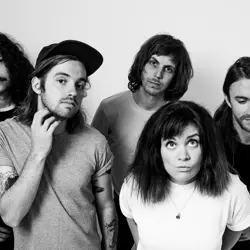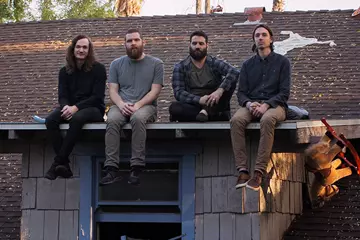 Clowns
ClownsFor years now Melbourne punks Clowns have been recognised around the world for the abrasive power and intensity of both their riotous live shows and their equally raucous recordings. On fourth album Nature/Nurture though, a whole new dimension to the five-piece has been uncovered, now visible through the chaos.
On the sonic front there’s a steadfast determination not to be pigeonholed as the band examine just how far they can stretch their sound within the tight constructs of the punk genre. This is offset by a newfound willingness to lyrically explore concepts and topics which work the cerebral as hard as their music hits the physical. It’s a brave and potentially risky move but one they’ve handled with typical aplomb. All the facets that first made them so beloved by their rabid fanbase are still abundant but now augmented by this new sense of artistic ambition – primarily manifesting in the eternal ‘nature versus nature’ behavioural debate which conceptually ties the album together – that offsets their usual unruly aesthetic perfectly.
“We just wrote a couple of songs, not really sure what we were doing but knowing that we wanted to make another record, and then the idea just kinda surfaced to call the record Nature/Nurture and to have each side of the record represent those two separate ideas,” explains frontman Stevie Williams. “We also knew we wanted to have the two songs on there called Nature and Nurture, and I guess the aim as well was to make songs which juxtapose and contradict each other with their messages and ideologies, songs which ideologically clash heads but at the same time are clearly part of the same record and pieces of the puzzle that make up the sounds and messages.
“At the end of the day it just becomes a symbol of what we all are internally, an amalgamation of nature and nurture intertwined into one massive juxtaposition with opinions.
“We’re a mess of contradictions and that’s kinda the idea – everyone’s got views about the world that they hold strongly but there are always exceptions to those rules and ways in which they contradict them. It’s getting pretty cryptic at this point, but I guess it’s just a study of the human condition in our own little twisted adolescent-punk kinda way.”
“We’re a mess of contradictions and that’s kinda the idea."
Don't miss a beat with our FREE daily newsletter
Williams concedes that while strong lyrics are always aspirational for any decent band, they aren’t always imperative in punk music. “I love all kinds of music, so I definitely wanted to make this record seem like something which finds us lyrically on top of our game,” he reflects. “And being our fourth record and how much of the creative process we’ve put into this band collectively – but also all our other side projects and stuff – we’re definitely at the point now where we really want to challenge ourselves, and bring stuff out that does really make you think.
“But at the same time I love adolescent music – I love [Descendents’ 1982 classic] Milo Goes To College, that’s one of my favourite records, and I love all that early Silverchair stuff – and I think that really plays a part too in the Clowns aesthetic. Certainly it’s nostalgic but it speaks to a more adolescent side.
“Plus I think with this record too being a particularly strong batch of songs lyrically – in terms of Clowns back catalogue I focused a lot harder on the lyrics on this one – but it does have an adolescent side to it. Like on the song Prick the final line of that one is, “… but he’s such a prick!” and I can’t imagine too many scholars will be quoting me on that down the track, or that too many people will be using vernacular like that in their university theses.
“But also at the same time with Prick I’m taking a bit of an irreverent, light-hearted swing at dickheads, and it does have a pretty strong message behind it even if the words are just things you’d hear any old schmuck use down at the pub.
“The tone of that song has a theme that runs much deeper than just skin level, and that’s what we were trying to do over the entire record – if anyone just wants to listen to it once, it has great listenability. But the more you listen and start to scratch below the surface, you discover that it’s a real study on humankind with genuine substance.”
On recent single I Wanna Feel Again – a moving exploration of mental health issues – Clowns even throw vulnerability into the mix, although it too ends up a typical Clowns noisefest eventually. “I think that’s our first emo song, and probably our last emo song,” Williams laughs. “It was good to open up a more vulnerable side in the lyrics, which we’ve probably neglected in the past. I was stoked with how that song came out, and I guess for anyone following the lyrics if it speaks to them and encourages them to speak out or get something better in their lives then I’m really glad we did choose to be a bit more vulnerable than the usual ‘tough guy’ machismo thing we do.”
And while Clowns’ third album Lucid Again (2017) did take some different musical tangents, Nature/Nurture is even more experimental in nature, which the vocalist explains was the plan all along. “It’s definitely conscious,” Williams offers. “We always want to be forever growing as a band and forever experimenting with new sounds, and continue to mix the genre of punk with all kinds of wacky instruments and wacky genres because punk music is just so awesome and we don’t want to be confined to just one area of punk and paint ourselves into a corner.
“Like just because our first record [2013’s I’m Not Right] was a The Bronx-style punk record doesn’t mean that we can’t do a seven-minute long synth-laden sitar-punk track – we want to be able to leave the door swinging and do whatever we want.
“And just from my own observations the best bands are the ones that continue to reinvent themselves and make records that sound fresh and interesting, and they’re not making the same record over and over again. For us it’s a calculated effort to keep things interesting.”















